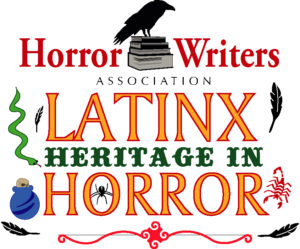Latinx in Horror: Interview with A.E. Santana

 A.E. Santana (she/her) is a Southern California native who grew up in a farming community surrounded by the Sonoran Desert. A lover of horror and fantasy, her works can be found in Latinx Screams, Demonic Carnival III, and other horror anthologies. She is the managing editor for Kelp Journal & Books, the moderator for the horror book club, The Thing in the Labyrinth, and the communications manager for Full Circle Players in Riverside, California. A.E. Santana is a member of the Horror Writers Association, the Denver Horror Collective, and has been a moderator for several horror panels, including “No Longer the Scream Queen: Women’s Roles in Horror.” She received her MFA in fiction from the University of California, Riverside’s low-residency program. Her perfect day consists of a cup of black tea and her cat, Flynn Kermit.
A.E. Santana (she/her) is a Southern California native who grew up in a farming community surrounded by the Sonoran Desert. A lover of horror and fantasy, her works can be found in Latinx Screams, Demonic Carnival III, and other horror anthologies. She is the managing editor for Kelp Journal & Books, the moderator for the horror book club, The Thing in the Labyrinth, and the communications manager for Full Circle Players in Riverside, California. A.E. Santana is a member of the Horror Writers Association, the Denver Horror Collective, and has been a moderator for several horror panels, including “No Longer the Scream Queen: Women’s Roles in Horror.” She received her MFA in fiction from the University of California, Riverside’s low-residency program. Her perfect day consists of a cup of black tea and her cat, Flynn Kermit.
What inspired you to start writing?
On both sides of my family, oral storytelling seemed to be a way of life. My favorite stories were the scary ones, so I begged anyone who would listen to please tell me a scary story (which earned me my fair share of strange looks). I was frightened and in awe of el cucuy, la llorona, and el chupapcabra (very prevalent stories in my agricultural community). These stories are what inspired me to make my own. I started writing my own stories as soon as first grade but didn’t realize that I could BE an author until the third grade, when one of my poems was published in the local newspaper.
What was it about the horror genre that drew you to it?
Even as a child, I was obsessed with horror. After some self-reflection, I realized that my penchant for horror was spawned by an unstable and stormy household. Many horror writers and fans have often argued that horror isn’t so much a genre as it is a feeling, and I know that feeling very well. Trauma survivors will sometimes identify with their trauma to survive. Processing those complicated and painful emotions come later. Horror stories (whether it be books or movies) have been safe place for me to process my fear, anxiety, sorrow, and hurt related to my childhood.
Do you make a conscious effort to include LatinX characters and themes in your writing and if so, what do you want to portray?
Absolutely. All my main characters, so far, are Latinx, even if it doesn’t say so explicitly in the story—they just are in my brain! Recently, I’ve been trying to show that they are of Latin descent because representation matters. My family is from Mexico, and the traditions that I grew up with are my status quo; to me, it’s weird to think of them as “foreign.” So, I want to flood my writing with Latinx characters and themes since that feels authentic to me. That’s how I can write real people and real stories, even if it’s, say, a supernatural horror. I want my non-Latinx readers to read my stories and, hopefully, see an individual, not a stereotype or a stock character. So, that’s what I want to portray—Latinx people as individuals.
What has writing horror taught you about the world and yourself?
Writing horror has taught me how much sadness I hold. I had thought that my love of horror proved how brave or tough I was, but the stories I write are always tinged with despondency and grief. Perhaps I have not grieved enough, and writing horror is the one way I know how to do so? Either way, I only recognized this proclivity to sorrow after reflecting on my writing.
As for the world, writing horror has taught me that there are many who are eager to turn a blind eye toward real-world horror. Lots of people seem to be fine with supernatural terrors, but human monsters strike another chord. Unless they are hardcore horror fans (and sometimes not even then), people don’t want to deal with the reality of human evil, even in fiction.
How have you seen the horror genre change over the years? And how do you think it will continue to evolve?
There has been an amazing push for inclusivity and diversity in the genre. People are beginning to understand that just because a work is horror that doesn’t make it okay for creators to torture and humiliate as they please, especially if they are being racist, bigoted, and sexist. Someone else’s trauma isn’t your playground for the sake of “art.”
But the biggest change in horror isn’t how the genre is changing, but rather how people are reacting to it. For me, the core of horror is a commentary on societal and individual fear. I feel that this is finally being acknowledged as important to the zeitgeist. People are also finding compassion in horror—compassion for Frankenstein’s monster, for Dracula, for the Creature from the Black Lagoon (who I just found out is canonically Latinx), etc. With this compassion, we are finding new monsters where before we thought were saviors.
On that note, going forward, I think we might see a trend of the fear of someone who is “other” switch to the fear of the people we are closest to.
How do you feel the LatinX community has been represented thus far in the genre and what hopes do you have for representation in the genre going forward?
The representation has become better. A big thank you for this is owed to authors like V. Castro, Cina Pelayo, and Gabriel Iglesias. It’s obvious that these authors, along with many others, work their fingers to the bone to get where they are. It has not been easy, and they persevered. Authors like these prove to big publishers that there is a community of people who want their stories. So, the Latinx representation within the horror community has improved.
But before now, I honestly don’t think representation has been great, and it’s slow going. For a long time, if you wanted a Latinx scary story (with proper themes, characters, and representation), you’d have to go find it in another language—whether on film or in literature—you’d have to go to the source (Latin America) because it wasn’t being produced in the United States. We’re seeing foreign films from all over gain a bigger audience in the States, thanks to many streaming sites. I think that companies like indie presses and indie film studios are going to take the Latinx and other marginalized communities to a real place of success and recognition (many already are) before mainstream companies take a larger role in producing and distributing; however, it will get there!
Who are some of your favorite LatinX characters in horror?
Noemí Taboada from the novel Mexican Gothic by Silvia Moreno-Garcia. She is brave, kindhearted, intelligent, witty, fun-loving, and fashion-forward. Noemí is written with the beautiful complexity that signifies a well-rounded character. She proves that a “strong female protagonist” doesn’t have to forfeit any of her femininity or softness to also embody the strength, dedication, and flair of the main character.
Ramirez (Jacob Vargas) from the film Devil. What I loved about this character was that he didn’t withhold his beliefs or ideas when faced with opposition or scorn. BIPOC characters are often watered down to be palpable for general audiences or stereotyped. Ramirez was steadfast in his beliefs while trying to save the lives of others. He was valiant in the face of danger and others’ ignorance.
Santanico Pandemonium (Salem Hayek) from the film From Dusk till Dawn. Santanico is raw power—wielding her sexuality, charisma, and authority to demand the attention and devotion of those around her (in the film and in the audience). While evil, it is not her sexuality that vilifies her, and she is not looked down upon for her strength and sensuality. She is unapologetically a monster and is in complete control.
Who are some LatinX horror authors you recommend our audience check out?
There are many amazing Latinx horror authors out there, and I am discovering more and more. Here is a short list of some of my favorites; I hope others will find a favorite among them. V. Castro, Cynthia (Cina) Pelayo, Silvia Moreno-Garcia, Carmen Maria Machado, Rios de la Luz, Monique Quintana, Laura Diaz de Arce, Sergio Gomez, E. Reyes, and Gabriel Iglesias.
What is one piece of advice you would give horror authors today?
Don’t listen to the naysayers who may think that horror is low-brow or not refined enough to be proud of as a writer. Feel that pride in your work and write it all out. On that note, sometimes, we are scared to write the horrors we know because we don’t want people in our lives to recognize the situation or even themselves. But as someone once told me, and I have seen repeated, “If people didn’t want you to write about the shitty things they did, then they shouldn’t have done those shitty things.” Don’t be afraid to go deep.
And to the LatinX writers out there who are just getting started, what advice would you give them?
Don’t try to imitate the voice of another author; instead, experiment and discover what your storytelling sounds like. Representation is best when there is more than one person from the same community, and each person is being seen as different from one another. Not only will this promote better representation, but it will also help your stories stand out. I found a lot of my early success by writing to themed submissions while dialing in on my unique voice. It’s unfair for any one person to carry a whole community, so think about it as putting a “you-spin” on the stories and not necessarily a “Latinx-spin,” the latter will naturally follow.



